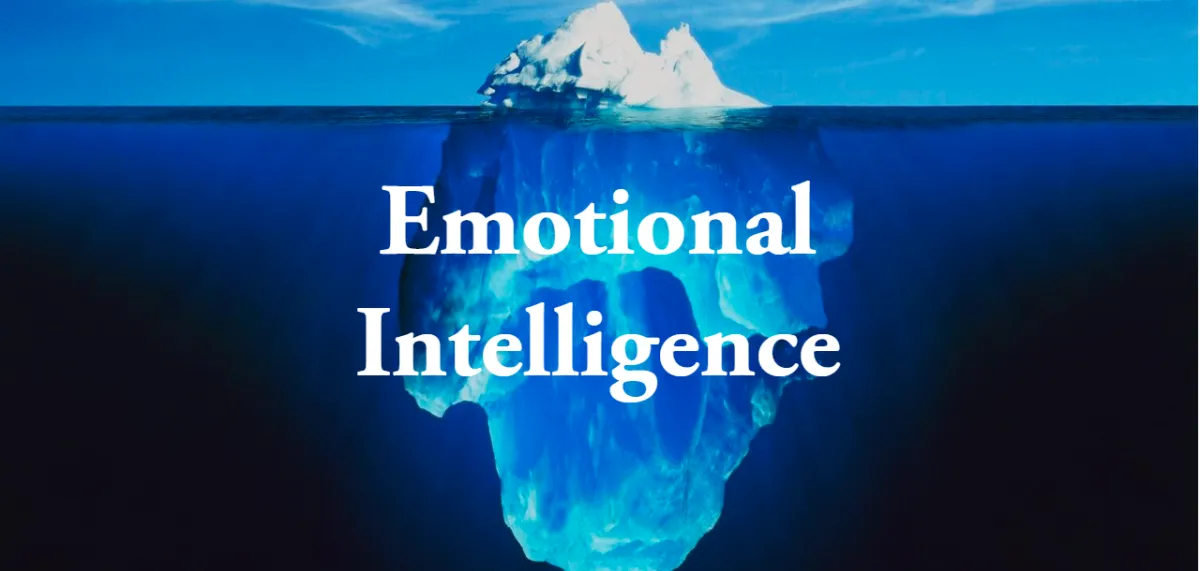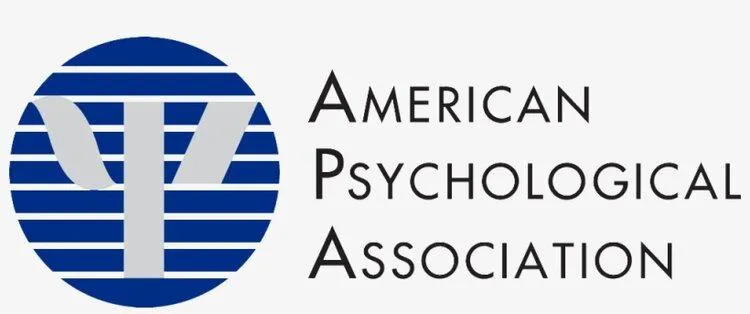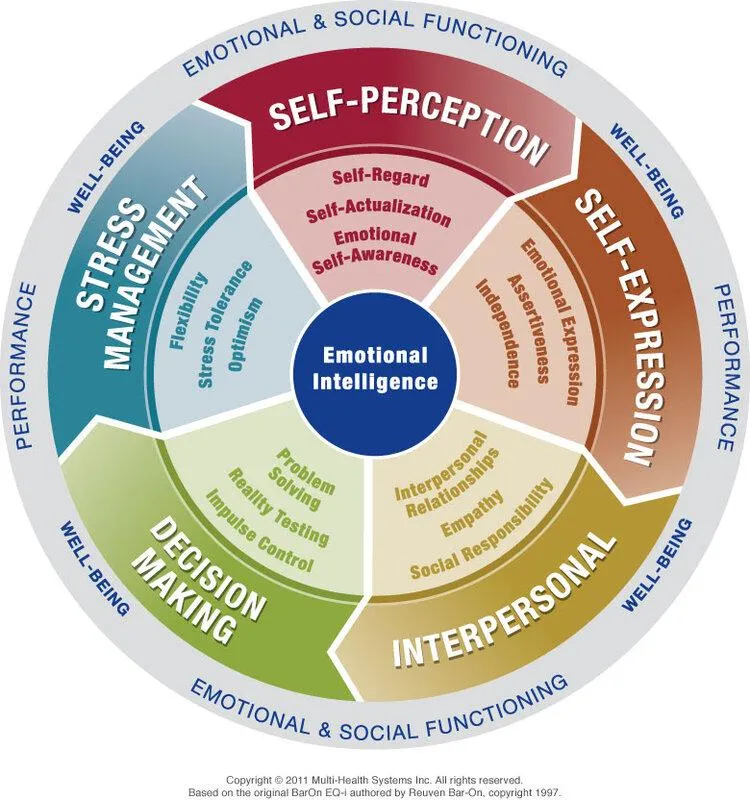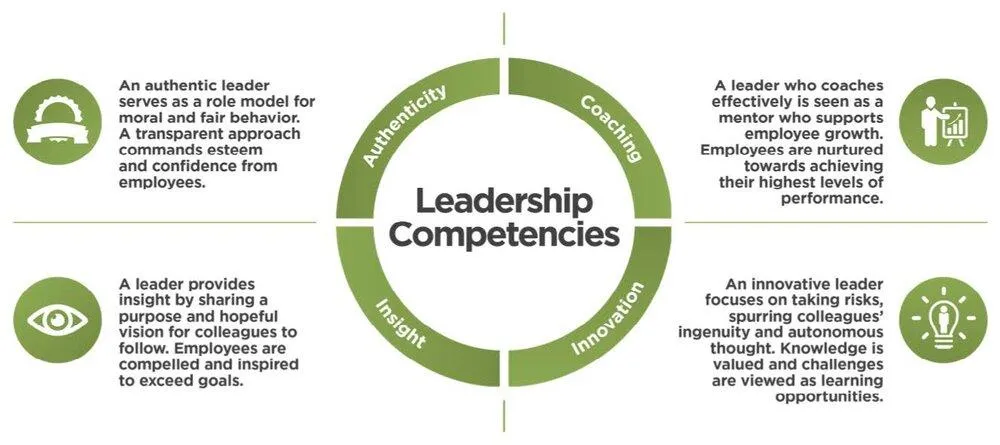



What is Emotional Intelligence?
Emotional Intelligence (EQ) has been studied in higher education at schools including Harvard and Yale for nearly 50 years. Fortune 100 companies, governments, and top leaders in business around the world have all trusted the science that underpins EQ to maximize performance and well-being.
Emotional intelligence is defined as a set of emotional and social skills that influence how we perceive & express ourselves, develop and maintain relationships, cope with challenges, and use emotional information in an effective and meaningful way.
Why is Emotional Intelligence Important?
While emotional intelligence isn’t the sole predictor of human performance and leadership development, studies have shown it is the single largest component is well-being and performance and responsible for nearly 45% of success, even more than IQ.
Unlike IQ, Emotional intelligence is not a static factor. One’s EQ can change over time and can be developed in targeted areas, making it an ideal area to focus attention and maximize results in any area of life.
The EQ-i 2.0® Model
The EQ-i 2.0 is a psychometric assessment that measures emotional intelligence. It is the first scientifically validated tool to measure how Emotional Intelligence impacts people in their personal & professional lives that is backed by the American Psychological Association. In order to qualify for ranking as a scientifically validated psychometric assessment, the tool must meet rigorous standards
READ MORE about how the EQ-i 2.0 has proven its effectiveness to meet this standard.

The Composite Scales
Intra-personal, Self-expression, Interpersonal Relations, Decision Making, and Stress Management
The EQ-i 2.0 is comprised of five composite scales measuring distinct aspects of emotional and social functioning. The five composite scales are further broken down into a total of 15 individually scored sub-scales.
The availability of this information provides critical development opportunities, allowing the practitioner to gain an understanding of their strengths and areas for improvement, and creates powerful opportunities to build effective action plans for both personal and professional development.

APPLICATIONS
• Employee Selection
• Higher Education
• Executive Coaching
• Employee Selection
• Leadership Development
• Behavioral Therapy
• Happiness & Wellbeing
• Organizational Development
EMPLOYEE
Assessing an individual’s emotional intelligence can help identify the need for targeted development programs and ensure proper placement. This will lead to dramatic improvement in overall development and performance, interaction with others, and identifying leadership potential.
RECRUITMENT
The EQ-i 2.0 is versatile in workplace environments and used as a highly effective screening tool in hiring, leading to the selection of emotionally intelligent, emotionally healthy employees who have the greatest likelihood of longevity and highest levels of success.
RETENTION
The EQ-i 2.0 makes the recruitment and selection process reliable and efficient, leading to higher retention rates. A more efficient recruitment process results in significant cost savings in reduced turnover, improved employee effectiveness, and increased morale. The placement of well-selected employees is a fundamental building block of a high producing, healthy company culture.
LEADERSHIP
Emotional Intelligence has become a prolific topic in leadership development.
Leadership & Emotional Intelligence- The Keys to Driving ROI & Organizational Performance
is published research done by the Human Capital Institute (HCI) and Multi-Health Systems (MHS). The study uses insights from organizational leaders surveyed to address the importance of EQ in developing leaders, shaping organizational culture, and ultimately increasing an organization’s financial performance.
Technical skill, IQ, vision, analytical ability, persistence, strength, and determination have long been accepted as main indicators of one’s leadership potential and ability. While effective leadership requires these traits, studies over the past 2 decades have shown EQ to be the key skillset that separates the world’s most successful leaders.
While hundreds of articles and studies have supported these findings, Psychologist Daniel Goleman first published this concept in
Primal Leadership- Harvard Business Review (Goleman, Boyatzis, McKee) in 1998. Goldman’s research of over 200 large companies was the first to confirm that the most powerful & effective leaders in the world possess a higher degree of emotional intelligence.
The EQ-i 2.0 and EQ 360 offer critical insights on EQ to help identify capability by measuring primary components of effective leadership such as risk tolerance, communication capability, team management, and meeting facilitation. These tools have become the global standard for effectively measuring talent, fit, potential, and are ideal for use in individuals and organizations for leadership selection and development.
Organizations that prioritize investment in leadership development over other training options experience tangible ROI. Organizations that invest more in leadership development report increased revenue, showing the relationship between Leadership Development and financial performance. Looking at the largest gaps between individual contributors and managers, it is clear that the important leadership skills identified require a degree of Emotional Intelligence at their core.
A leader who embodies leadership competencies is more likely to increase work satisfaction, create trust, foster organizational commitment, and loyalty, utilizing the four leadership dimensions inherent to most models of leadership:
Authenticity, Coaching, Insight, and Innovation
When considering leadership, Emotional Intelligence is the difference that makes the difference.

HIGHER EDUCATION
“More students leave college because of disillusionment, discouragement, or reduced motivation than because of the lack of ability or dismissal by school administration” - DR. EDWARD CHIP ANDERSON OF STRENGTHSQUEST
Research shows with almost 25% of first-year students leaving before their sophomore year, post-secondary life and education can be challenging. Students often feel overwhelmed, lonely, isolated, and have difficulty adjusting to the demands of college and university. (HERI, 2012)
Emotional intelligence development improved, specifically interpersonal and stress management skills, translated into better grades, and increased persistence in post-secondary education. (Keefer, Parker, & Wood, 2012, 3 Richardson, Abraham, & Bond, 2012)
We believe that performance is the result of developed skills, sustained motivation, beliefs, and values. With nearly 50 years of combined unique experience in Higher Education, Business, and Leadership Development, our instructors understand the needs, challenges, and values of modern-day leaders. Our customized programs were created to support organizations & professionals in times of transformation, development, and change.
The unique advantage of Emotional Intelligence development is that it enhances skills every individual already has. Our vision is to support our students by accessing these tools early, to achieve professional & personal excellence by maximizing human potential during the critical developmental years in Higher Education.
The Emotional Intelligence in Higher Education Program provides a framework for students to understand their Emotional Intelligence (EQ) in order to foster academic and life success. Using the model developed by Dr. Reuven Bar-On, the program explores 16 fundamental tools that are easily learned and that anyone can use. Participants will explore areas of strength and areas for improvement within their own Emotional Intelligence framework.

Teams and Organizations
The EQ 360® Model
Teams with higher Emotional Intelligence statistically outperform teams with a lower EQ score.
Team goals capture the interpersonal dynamics and interactions among team members. The scores of individual team members are aggregated and averaged to compute an average team emotional intelligence score.
Data suggests that teams comprised of members who on average are dependable, responsible, have good social skills, and have a positive outlook on life engage more effectively in team interpersonal processes and task orientation than teams with lower average scores.
(Frye, Bennett, Caldwell)
Results have included increased cooperativeness, emotional flexibility, adapting to change, and creative problem-solving. Development in these areas increases the quality & effectiveness of the team as a whole and directly correlates with increased productivity & profitability for the company.
The benefits of Emotional intelligence to a team are substantial, quantifiable, and can improve any team.
“If you’re a leader and you want to mobilize your team, one of the first things you can do...is listen to them. Empathy is a critical skill to begin with for leaders. By listening to people and understanding where they’re coming from, you’ll have a better handle on how to motivate those people and what’s important to them... That’s the first step in your ability to influence people, and influencing people is a critical skill for leaders.” -DR. STEVEN STEIN, CEO MHS
EQ-i 2.0® REPORT SUITE
Organizations are made up of multiple levels and the EQ-i 2.0 Report Suite is designed to target solutions at every level. This multi-level approach to developing emotional intelligence shows how developing individual EQ can impact team performance, which in turn influences the organization. Based on the needs of the individual and their workplaces, this suite may be used to choose reports that will best develop targeted solutions.
RETURN ON YOUR INVESTMENT
You need to be bottom-line focused and show real results in order to get buy-in from your key decision-makers to prove how the EQ-i will make a significant difference in:
•TRAINING and DEVELOPMENT of your employees
•Development of your LEADERS
• SELECTION of highly qualified future leaders to your organization
THE PROOF IS IN THE RESULTS
It’s not enough to say that it will work. We need to bring to the table evidence of a clear return on investment; that is: clear statistics and research that link the EQ-i to:
• Higher sales and profits • Increased performance • Improved customer satisfaction
• Decreased attrition rates • Reduction in training costs
Read Case Studies from American Express, Fortune 100 Insurance Company, United States Air Force, and more...
*The EQ-i 2.0 is now included in the Nineteenth Buros Mental Measurements Yearbook(MMY). The inclusion & positive review in the MMY is an important milestone for the assessment that acknowledges the scientific rigor & effectiveness of its development.
*This research study is a collaborative effort between the Human Capital Institute (HCI) and Multi-Health Systems (MHS). An online survey was conducted in 2013 with 784 respondents representing more than 500 organizations worldwide.